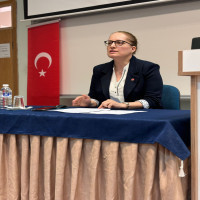Research Articles
Translations
Book Reviews
Issue Editorial Board

Assoc. Prof. Dr. Nagehan UÇAN EKE
MUĞLA SITKI KOÇMAN ÜNİVERSİTESİ, EDEBİYAT FAKÜLTESİ
 0000-0002-1699-9395
0000-0002-1699-9395
 0000-0002-1699-9395
0000-0002-1699-9395
Filoloji, Karşılaştırmalı Edebiyat, Osmanlı Sahası Klasik Türk Edebiyatı
Sanat Tarihi

Asst. Prof. Dr. Ahmed Ünal BOZYER
Muğla Sıtkı Koçman Üniversitesi, Edebiyat Fakültesi, Sosyoloji Bölümü
 0000-0002-8492-5099
0000-0002-8492-5099
 0000-0002-8492-5099
0000-0002-8492-5099
Aile Sosyolojisi, Değişme, Azgelişmişlik ve Modernleşme Sosyolojisi, Eğitim Sosyolojisi, Hukuk Sosyolojisi, Kent Sosyolojisi, Kırsal Alanlar Sosyolojisi, Siyaset Sosyolojisi, Sosyal Değişim

Türk Halk Bilimi
Assoc. Prof. Dr. Bekir ÖZER
Muğla Sıtkı Koçman Üniversitesi Edebiyat Fakültesi Arkeoloji Bölümü
Arkeoloji, Arkaik Dönem, Seramik

Assoc. Prof. Dr. Nilüfer TANÇ
Muğla Sıtkı Koçman Üniversitesi
Filoloji
Veli UĞUR
MUĞLA SITKI KOÇMAN ÜNİVERSİTESİ, EDEBİYAT FAKÜLTESİ
Yeni Türk Edebiyatı

Assoc. Prof. Dr. Yunus İNCE
MUĞLA SITKI KOÇMAN
Sosyal, Beşeri ve İdari Bilimler

İngiliz Dili ve Edebiyatı
Kubilay HOŞGÖR
MUĞLA SITKI KOÇMAN ÜNİVERSİTESİ, EDEBİYAT FAKÜLTESİ, FELSEFE BÖLÜMÜ
Felsefe, Dil Felsefesi, Epistemoloji /Bilgi Felsefesi, Estetik, Kültür Felsefesi, Metafizik, Modern Felsefe, Ontoloji, Tarih Felsefesi, Yirminci Yüzyıl Felsefesi
Aim & Scope
bitig Journal of the Faculty of Letters and Humanities aims to contribute to the knowledge of social sciences by publishing national and international original scientific research articles in the field of language, literature, social and human sciences. bitig Journal of the Faculty of Letters and Humanities, which is an international refereed journal, publishes two issues in a year (June and December). With its open access policy, the journal provides researchers with comfortable and unlimited access.
bitig Journal of the Faculty of Letters and Humanities, which is the publication organ of Muğla Sıtkı Koçman University Faculty of Letters, covers basic field studies in the fields of Archeology, Contemporary Turkish Dialects and Literatures, Philosophy, English Translation and Interpretation, English Language and Literature, Psychology, Art History, Sociology, History, Turkish Language and Literature. In these fields and related sub-fields, both conceptual and field research-based studies are included for the dissemination and development of knowledge, in an interdisciplinary manner.
Author Guidelines
Scientific studies sent to bitig Muğla Sıtkı Koçman University Journal of Faculty of Letters and Humanities must not have been previously published or sent for publication elsewhere. The publication decision regarding the studies submitted to the journal, the identity of the authors and referees are kept confidential. Scientific and original research articles, translations and book reviews in the fields covered by the journal can be sent to the journal. More than one work by the same author cannot be published in the same issue of the journal.
The journal accepts articles in Turkish and English.
Spelling and punctuation are based on the latest edition of the TDK (Turkish Language Institution) Spelling Guide. The papers submitted should be clear and understandable and in accordance with scientific criteria in terms of language and expression. If necessary, corrections can be made in the papers in terms of spelling rules by the editors.
It is the responsibility of the authors to ensure that the papers comply with the code of ethics. The similarity rate to other scientific publications should not exceed 25%. However, the editor reserves the right to request an ethics committee document from the authors when necessary.
The page limit for research articles submitted to the journal is 20 pages; 10 pages for book reviews. Translations, text publications and works containing excavation reports in the field of archeology are excluded from this rule.
Submissions from the basic fields of social sciences and philology are accepted to the journal.
Title: It should be precise and understandable for the experts in other fields and should reflect the content of the article. Only the first letter of the words should be capitalized (excluding the conjunctions). They should be in 14 font size, bold and centered. The English title should be written under the Turkish title and should be in 12 points.
Author's Name: The first letter of the author's name and all letters of the surname should be written in capital letters, 11 font size, bold and centered. The institution where the authors work, their e-mail addresses and ORCID numbers should be given in the footnote with a “*” sign.
Abstract: At the beginning of the article, there should be abstracts in Turkish and English, consisting of at least 250 and maximum 500 words. They should briefly express the subject matter of the article. There should be "Keywords"(anahtar sözcükler) under the abstracts after a single space left and they should consist of at least 5 and at most 8 words. Abstract sözcükler should be in single line spacing and in 10 points.
Layout: Papers must be sent in the format specified below. Papers that are not uploaded to the system in this format will not be evaluated. They should be prepared in MS Word Program and should be justified.
Paper Size: A4 Vertical
Top Margin: 2.5 cm
Bottom Margin: 2.5 cm
Left Margin: 2.5 cm
Right Margin: 2.5 cm
Font: Bookman Old Style
Font Style: Normal
Size (Normal Text): 11
Size (Footnote Text): 9
Table-Graphic: 9
Paragraph Spacing: Single Line (0 pt before, 0 pt After) (0 pt before and after in tables and graphs)
Line spacing: Text 1.5 (0 pt before, 0 pt after); abstract and footnote single line spacing
References: 0 cm per paragraph in the lines of the references (lines should be indented 1.25 cm)
For articles that use a special font, the font used should also be sent to the journal with the text.
The parts that need to be emphasized in the text should not be in bold letters but italicized or in double quotes.
Details such as page numbers, headers and footers should not be included in the articles.
Chapter titles: Only the first letters of all main titles should be capitalized and the main titles should be in bold, aligned to the left and similarly only the first letters of all sub-titles and other titles should be capitalized and they should be in bold and indented 1.25 points pixel. No other formatting should be used.
Tables, Graphics and Images: Tables, graphics and visuals should have numbers and titles, and these numbers and names should be just below the figure. Images to be used in articles should be in jpeg or tiff format and their resolution should not be lower than 300 dpi.
Abbreviations: In submissions, the abbreviations used in the articles, the official abbreviation index and rules of the language in which the article is written should be followed. For Turkish, the TDK Abbreviations Index should be taken as a basis.
Quotations: Direct quotes should be quoted. Quotations less than 4 lines should be quoted in the paragraph, quotes of 5 or more lines should be given in the form of independent paragraphs. Such blocks should have a space of 1,5 cm from the left and right of the citation, and should not be given a paragraph head and should be 10 pt size. The line spacing must also be 1 cm.
Footnotes should only be used for statements that cannot be made in the text, and the characters in this section should be arranged in 10 points and the line spacing must be 1 cm.
Submission: MLA style must be used as a citation system in the article. There must be a bibliography at the end of the article.
It should be stated in the format in single-authored publications like (Akar 2020: 56), and in multi-authored citations like (Ayan et al. 2013: 35).
If the name of the cited author is included in the text, only the publication year and page should be indicated: (2004: 37).
Electronic resources should be specified as (URL-1), (URL-2),… in the text and should be written as follows in the “Resources” section:
URL-1: Mesîhî (2020), Mesîhî Dîvânı, haz. Mine Mengi, https://ekitap.ktb.gov.tr/Eklenti/10686,metinpdf.pdf?0 (e.t. 23.12.2020).
The names of the ancient works and authors should be given without any abbreviations.
Sample: Ksenophon, Oikonomikos, 2.21.
If there are more than three references to a concept or citation in the articles which sent to the journal, footnotes can be used.
References: References should be given in alphabetical order at the end of the main text according to the surnames of the authors.
Sample: Tanpınar, Ahmet Hamdi (1988), Huzur, İstanbul: Dergâh Yay.
If the article has two authors, the surname of the author who is first in the work is given first.
Sample: Parlatır, İsmail ve Nurullah Çetin (1996), Genç Kalemler Dergisi, Ankara: Akçağ Yayınları.
If the article has more than three authors, after the information of the first author, the abbreviation of et al (vd.) should be used.
Sample: Kaplan, Mehmet vd. (1983), Devrin Yazarlarının Kalemiyle Millî Mücadele, Ankara: Kültür ve Turizm Bakanlığı Yayınları.
The names of major-independent works such as book and journal titles should be written in italics (italics), minor-dependent works such as book chapters and poems should be written normally but in double quotes.
If the chapters of journal, encyclopedia article, book are used, page range information should be given at the end of the references.
If there is translator, compiler or preparer, the name of the editor should be given after the name of the author and the work.
Sample: Rosenau, P. Marie (1992), Postmodernizm ve Toplum Bilimleri, çev. Tuncay Birkan, İstanbul: Ark Yay.
In case there is more than one work of the same author with the same date in the references, it should be shown as "a, b, c ...".
Sample: (İpekten 2001a: 82)
If the thesis is used, the surname-name of the author, the date of the thesis, the title of the thesis in italic characters, the type of the thesis, the name of the city and the university should be included.
Sample: Dündar, Leyla Burcu (2001), Murathan Mungan’ın Çağdaş Masallarında Cinsiyetçi Geleneğin Eleştirisi, Ankara: Bilkent Üniversitesi Ekonomi ve Sosyal Bilimler Enstitüsü Türk Edebiyatı Disiplini Yüksek Lisans Tezi.
Ethical Principles and Publication Policy
(1) Scientific journals owned by Muğla Sıtkı Koçman University adhere to the ethical principles and publication policies with the editorial and advisory board members, referees, and authors involved in the publication process. Manuscripts submitted to the journal for publication should comply with the rules of “Scientific Research and Publication Ethics Directive of Higher Education Institutions.” Statements listed under “Actions Against the Scientific Research and Publication Ethics” are to be avoided.
(2) ULAKBİM article dated 15/02/2020 states, “every discipline is required to have obtained an Ethics Committee Approval if they are engaged in experimental research that involves humans and animals. The approval should be documented separately and be expressed clearly within the article.”
Any submission which does not conform to the above statement is not going to be considered for publication.
(3) Additionally, while evaluating the article submissions, COPE’s (Committee on Publication Ethics, https://publicationethics.org/) international standards for authors and editors are referred.
Ethical Responsibilities of the Editorial Board
(1) The Editorial Board is responsible for every article submission to bitig Journal of Faculty of Letters and Humanities, and that applies for the whole process – from the receipt of the manuscript until the publication of it.
(2) The Editorial Board preserves the intellectual property rights of the published articles.
(3) The Editorial Board examines the article submissions in matters of plagiarism, scientific originality, and ethics.
(4) The Editorial Board sends the manuscripts to language and style coordinators of the journal by hiding the personal details of their authors. Here, the coordinators make sure that style guidelines have been met. In this regard, if the manuscripts require stylistic correction, the authors can be asked to upload their papers to the system again, making sure that the necessary corrections have been made.
(5) Manuscripts qualifying with the standards of the journal are sent to two referees by the Field Editors. The ones that receive approval (with no correction, minor correction, or major correction) by both referees are processed towards publication. If there is a positive and negative report, in this case, the manuscript is sent to a third referee, and the binding decision is given based on the third referee’s report.
(6) The Editorial Board keeps the identity of manuscript owners confidential, and thus ensures that each article is evaluated impartially within the specified time.
(7) The Editorial Board considers it highly if consistent criticism is received for the published articles and therefore gives their authors the right to respond.
(8) The Editorial Board continuously strives to improve the quality of the journal through its publications.
(9) The Editorial Board maintains effective communication with those involved in the publication process and therefore meets periodically in line with the development goals of the journal.
Ethical Responsibilities of the Advisory Board
(1) The academics appointed as advisors to bitig Journal of Faculty of Letters and Humanities are chosen based on their fields of expertise.
(2) Advisory Board members conduct their evaluations always bearing in mind the principle of impartial judgment.
(3) The Advisory Board members – as well as promoting the journal on national and international platforms, finding suitable referees, and expanding the pool of referees, are responsible for professional advice to the editorial board in scientific and technical matters, which all are the practices aiming to improve the journal's quality.
Ethical Responsibilities of the Referees
(1) The principle of blind refereeing is applied in bitig Journal of the Faculty of Letters and Humanities. Referees do not communicate directly with authors.
(2) Referees only to evaluate the articles related to their field of expertise.
(3) The referees conduct the evaluation within the principles of impartiality and confidentiality.
(4) The referees are obliged to evaluate the articles they accept within the time given to them.
(5) The referees make their evaluations in a constructive manner; they avoid harsh criticism and personal comments.
Ethical Responsibilities of the Authors
(1) Articles sent to the journal should not have been published anywhere before. Otherwise, the author is deemed to have accepted the possible legal responsibilities.
(2) Authors who submit their studies to the journal should precisely provide their academic titles, name and surname, and the institution they work for. They should indicate the full address, telephone number and e-mail address where they can be contacted directly.
(3) It is the author's responsibility that the manuscripts submitted to the journal are original and that they are written in accordance with scientific ethical principles. The author's plagiarism report is examined through various programs. If the result is above 25%, the article will not be evaluated.
Price Policy
bitig Edebiyat Fakültesi Dergisi'ne makale gönderim/süreç işletimi ücretsizdir.
bitig Journal of Faculty of Letters is licensed under a  Creative Commons Attribution-NonCommercial-ShareAlike 4.0 International License.
Creative Commons Attribution-NonCommercial-ShareAlike 4.0 International License.


